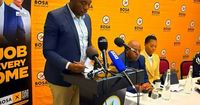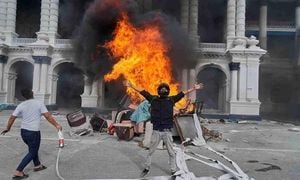Political tensions in South Africa have reached a fever pitch as parties jostle for influence within both national and municipal coalitions, with the fate of Johannesburg’s transport portfolio and the broader Government of National Unity (GNU) hanging in the balance. The events of August 22, 2025, have highlighted deep divisions among key players, raising questions about the future of coalition politics in the country’s largest city and at the national level.
In Johannesburg, the contest for the influential position of Member of the Mayoral Committee (MMC) for Transport has become a microcosm of the broader political wrangling gripping South Africa. The vacancy arose following the resignation of Kenny Kunene, and now two major opposition parties are staking their claims. The Economic Freedom Fighters (EFF), a party known for its vocal advocacy and radical economic policies, is pushing for Mgcini Tshwaku to fill the role. Meanwhile, the Patriotic Alliance (PA) has insisted that its newly appointed councillor, Liam Jacobs, should take over the position.
According to reporting from multiple South African news outlets, the PA’s demand is clear: "The PA is demanding that its newly appointed councillor, Liam Jacobs, take over the position of transport MMC in Johannesburg." The party’s leadership believes Jacobs is uniquely qualified to steer the city’s transport portfolio at a time when Johannesburg’s infrastructure faces mounting challenges. Their insistence has set them on a collision course with the EFF, which contends that Tshwaku is the right candidate for the job. The EFF’s bid is equally forceful, with party officials stating that they want Mgcini Tshwaku to take over the transport MMC position left vacant by Kunene’s departure.
This political tug-of-war is emblematic of the broader instability and factionalism that have characterized Johannesburg’s municipal government in recent years. The city’s coalition arrangements, often fragile and subject to shifting alliances, have made it difficult for any single party to implement its agenda unimpeded. The current standoff over the transport MMC position is just the latest chapter in this ongoing saga, and residents are watching closely to see who will ultimately assume the influential role.
While local politics in Johannesburg simmers, the national stage is witnessing its own high-stakes drama. The African National Congress (ANC), long the dominant force in South African politics, has resolved to consider broadening the Government of National Unity by including additional opposition parties. This move was prompted after several smaller parties that supported the passing of the national budget signaled their interest in joining the unity government. The ANC’s proposal is seen by some as a pragmatic attempt to shore up its governing coalition amid growing challenges from both the left and right.
However, not all parties are eager to jump aboard the GNU bandwagon. Build One South Africa (BOSA), led by the outspoken Mmusi Maimane, has categorically ruled out joining the unity government if the EFF and the MK Party are included in the coalition. Speaking at a media briefing in Johannesburg on August 21, 2025, Maimane made his party’s position unmistakably clear: "We can’t govern simply with people just for ministers. It requires a plan that is deliberate and that explains how we will deliver for the people of this country. If we don’t have a basis of agreement, what then is the purpose of governing?"
Maimane’s remarks reflect a deep skepticism about the viability of a coalition government that brings together ideologically disparate parties. He elaborated further, saying, "Adding political parties like MK and many others will complicate the issue and make it impossible for us to be part of what will become of parties that are not ideologically or governmentally coherent." For BOSA, the prospect of sharing power with the EFF and MK Party—both of which have sharply different policy priorities and political philosophies—is a nonstarter. As a result, Maimane pledged that his party would "gladly remain in Parliament’s opposition benches" rather than compromise its principles.
Despite BOSA’s firm stance, the ANC’s plan to expand the GNU remains up in the air. As of August 22, 2025, it is still uncertain whether the ruling party will actually follow through on its proposal. Some coalition members have voiced concerns that bringing more parties into the fold would not necessarily improve the government’s stability. In fact, several argue that expanding the coalition could exacerbate existing tensions with the Democratic Alliance (DA), the main opposition party, which has had a notoriously fraught relationship with the ANC in recent months.
The debate over the GNU’s future comes at a time when South Africa faces significant economic and social challenges. The need for effective governance is more pressing than ever, and many citizens are looking to their leaders for signs of unity and purpose. Yet, as the events in Johannesburg and the national capital reveal, forging consensus in a deeply divided political landscape is no easy feat.
For Johannesburg, the immediate question remains: who will take the helm of the city’s transport portfolio? The answer will likely depend on the outcome of behind-the-scenes negotiations between the EFF, PA, and other coalition partners. Both parties are digging in their heels, and there is little indication that either side is prepared to back down. The eventual appointee will inherit a host of challenges, from aging infrastructure to rising commuter demands, and their ability to navigate the city’s complex political terrain will be put to the test from day one.
Nationally, the ANC’s dilemma is equally thorny. The party’s efforts to broaden the GNU reflect both its desire to consolidate power and its recognition of the need for greater inclusivity. Yet, as BOSA’s refusal demonstrates, not all potential partners are willing to set aside their differences in the name of unity. The coming weeks will be critical as the ANC weighs its options and seeks to chart a path forward that balances stability with the diverse interests of South Africa’s political mosaic.
In the end, the latest political maneuvering in Johannesburg and at the national level underscores a fundamental truth about South African democracy: coalition building is as much an art as it is a science. With key positions up for grabs and the future of the GNU in flux, the country’s leaders face a daunting task—finding common ground in a landscape marked by deep-seated divisions and competing visions for the nation’s future.




